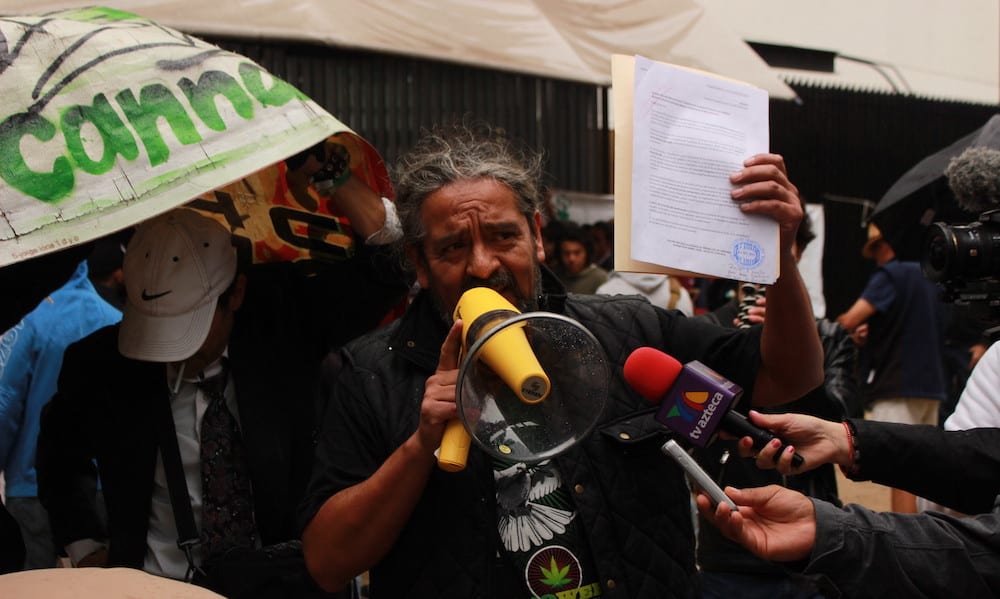On Thursday, the date Mexico’s Supreme Court set as the legislature’s deadline to pass a law legalizing adult use cannabis, advocates blocked the door of the Mexican Senate. In a steady rain, they called on legislators to pass fair and just marijuana regulation. A chant rose up with tendrils of smoke from the joints dotting the crowd: “Las cosas sencillas, yo quiero mis semillas.” (“It’s simple, I want my seeds.”) Mexican cannabis activists had declared that they would not be ignored as lawmakers deliberate over the country’s marijuana regulations.
It was the fifth day of the camp that activists had erected in front of the Senate building on Mexico City’s central avenue, Paseo de la Reforma. But the plantón, as such demonstrations are referred to in Mexico, was not just an attempt to put pressure on legislators to comply with the deadline given to them by the Supreme Court. They also wanted it to be clear that they want the legislation proposed last week by President Andrés Manuel López Obrador’s Morena Party to be revised to center the rights of cannabis users and the Mexican marijuana industry.
Last week, Morena Party legislators presented a draft of legislation that would legalize adult use cannabis. But cannabis advocates have bridled at some of the plan’s details, and a coalition of marijuana consumer groups sent a letter in response to Morena Senate leaders voicing their concerns in the hope that the draft would be revised by the time it makes it to a floor vote.

Activists Voice Their Concerns
Among the group’s primary issues are the requirement of a license for individuals to grow their own cannabis and even possess seeds; restrictions on the size of cannabis clubs and on what kinds of cannabis-based products will be available on the recreational market; insufficient protections for Mexican entrepreneurs within the new industry; and weak decriminalization measures for cannabis possession.
Mexico’s medical cannabis legislation does not currently authorize any production of the plant within the country, forcing medical cannabis users to purchase cannabis products that were manufactured elsewhere, largely the United States and Canada. Critics say this has given foreign companies an unfair head start in the country’s cannabis industry.
“The document they have given us comes from fear, from prejudices, and stigmas,” activist Jaciel Espinosa of Xochipilli Cannabis Club told reporters at a Thursday afternoon press conference while demonstrators blocked the visitors’ entrance of the Mexican Senate behind him. “The law focuses on criminalizing and persecuting the plant and its users,” added Pepe Rivera of the Mexican Institute of Cannabis.
Throughout Thursday afternoon and evening, musicians and speakers alternated on a small stage adorned with a sign proclaiming “Mexico Planta.” (“Mexico Plants.”) At 4:20 p.m., activist asked to enter the Senate building and when they were denied access, opted to block the visitors’ gates entirely while speakers addressed a crowd of reporters. The camp was scheduled to continue through the end of Friday.
President López Obrador campaigned on the premise that the regulation of drugs could reduce the violence of the war on drugs, which is on track to record casualties in 2019. The issue has been of particular concern after a high profile shootout between government forces and the Sinaloa Cartel that led to the capture and subsequent release of the son of incarcerated narco leader “El Chapo” Guzman.
Cannabis activist Leopoldo Rivera told members of the press that the only Senator who had visited the plantón that week had been Patricia Mercado. Mercado has been one of the leading voices in the Mexican legislature for expanding cannabis access, and has also pushed for the Department of Health to clarify its regulations regarding medicinal marijuana.
Rivera said Mercado was particularly concerned about the legislation draft’s absolute ban of the use of marijuana by pregnant women. “Every person is the owner of her own body,” said Rivera. “That clause seems particularly invasive and unacceptable.”
The Morena Party has indicated that it will try to get the proposed legislation to a floor vote by the end of the month. Party leaders say that by the end of the year, they hope to pass a law regulating all kinds of drugs.
But it seems clear that until the country has a regulation plan that centers the rights of cannabis users and Mexican industry, activists will continue to blow smoke at the authorities. After decades of the national push for cannabis legalization, they’re in the final lap and they want this race to finish strong. “Los pachecos unidos jamás serán vencidos,” they chanted, still being denied access to the Senate floor. English translation: Stoners united will never be divided.















Great article, please keep us updated.